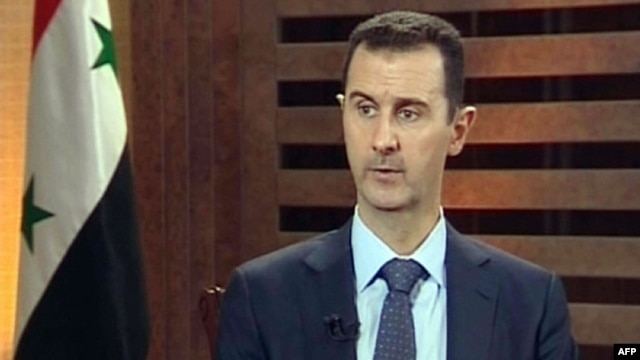
A grab from Addounia pro-regime Syrian TV shows Syrian President Bashar al-Assad speaking during an excerpt of an interview in Damascus, August 29, 2012.
Syrian President Bashar al-Assad said Wednesday his government is fighting a "regional and global battle" and that more time is needed to win the conflict against rebels trying to overthrow him.
His comments came as renewed fighting broke out between rebels and Syrian forces near the Taftanaz military airport, located between the northern cities of Aleppo and Idlib.
The Britain-based Syrian Observatory for Human Rights told VOA that 14 government troops were killed or injured in fierce fighting at Taftanaz, while three rebels died during the clashes. The group also says anti-government fighters damaged three to five helicopters at the airport.
Taftanaz has been targeted several times by rebels entrenched in the two cities, which have suffered daily shelling by government troops.
Comments signal long fight
In excerpts from an interview with Syria's privately-owned Addounia television, Mr. Assad described the situation on the ground as "practically better" but "not yet decided - that takes time."
The Syrian leader, who has vowed to defeat rebels he has characterized as Islamist terrorists, praised the army and security forces for their "heroic conduct."
"Despite several mistakes, there is a strong bond" between the government and the Syrian people, Mr. Assad insisted, boasting the support of the majority of the population. "Everyone is worried about their country, that is normal. But [opposition rebels] will not be able to spread fear, they never will," he said.
Mr. Assad also dismissed an idea being championed by neighboring Turkey of creating Western-imposed buffer zones within Syria to receive those displaced by the conflict.
"Talk of buffer zones firstly is not on the table and secondly it is an unrealistic idea by hostile countries and the enemies of Syria," Mr. Assad said. "Will we go backwards because of the ignorance of some Turkish officials? [The Turkish people] have stood by us during the crisis,'' he said.
The two countries once cultivated good relations but Turkish Prime Minister Recep Tayyip Erdogan turned against Mr. Assad over his violent response to the uprising.
Turkey Presses UN
Turkish Foreign Minister Ahmet Davutoglu said Wednesday Ankara has discussed with the United Nations the possibility of housing Syrian refugees inside Syria and that his government expected the world body to take concrete steps towards this end.
Turkey has proposed the idea of a "safe zone" to be set up for civilians under foreign protection as fighting intensifies in the 17-month uprising. Up to 5,000 refugees a day have been crossing into Turkey during the past two weeks. The U.N. warned Tuesday that up to 200,000 people could settle there if the conflict worsens.
A Turkish aid official said about 80,000 refugees are registered in camps along the country's 900-kilometer-long border with Syria and that new camps will increase this capacity to 120,000 within the next 10 days. Turkey's leaders have repeatedly said their refugee capacity stands at about 100,000.
The United Nations refugee agency has called for increased international assistance to help Turkey and Jordan cope with the surge in the number of Syrian refugees seeking shelter.
The U.N. High Commissioner for Refugees said Tuesday the number of Syrians fleeing to Jordan had doubled in the past week, compared to the previous week, with 10,200 arriving.
An agency spokeswoman said the new arrivals at the Za'atri camp in northern Jordan are mainly from Syria's southern flashpoint area of Daraa.
Battles near Damascus
In Damascus, activists reported a third straight day of army attacks on rebel strongholds in the eastern outer belt of the city, referred to as East Ghuta.
The Local Coordination Committees, a network of activists on the ground, said warplanes and helicopters bombed and strafed all the East Ghuta suburbs, while the Britain-based Observatory reported attacks by combat helicopters on the eastern suburb of Saqba as well as shelling further into the city in the district of Zamalka.
Increased attacks in and around Damascus over the past week have killed hundreds of people, including at least 320 in a single suburb Saturday, according to opposition groups.
Activists monitoring the violence report the death of 100 to 250 or more Syrians on daily basis, but these figures are impossible to independently verify.
On Tuesday, the Syrian military dropped thousands of leaflets over Damascus and its suburbs, urging rebels to hand over their weapons or be killed.
Syrian authorities blame the uprising on a foreign conspiracy and accuse oil-rich Gulf countries Saudi Arabia and Qatar, in addition to the United States and Turkey, of backing "terrorists" seeking to oust Mr. Assad's government.
Rights groups say at least 20,000 people have been killed since the insurrection broke out in March last year, while the United Nations says more than 214,000 people have fled to neighboring countries. |
|
